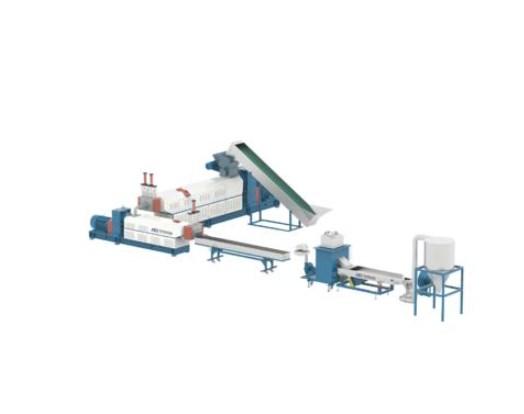The Industrial Pelletizer Machine plays a vital role in modern manufacturing and material processing industries, particularly in fields where raw materials need to be transformed into uniform pellets for further use, transport, or refinement. Whether it's in the plastics industry, pharmaceuticals, food processing, or chemical production, pelletizing is a critical step that enhances efficiency, product consistency, and operational sustainability.
At its core, an Industrial Pelletizer Machine is designed to convert bulk raw materials—often in powder, flake, or shredded form—into small, regularly sized pellets. This is done through various mechanical processes, depending on the type of machine. Common types include strand pelletizers, underwater pelletizers, and die-face pelletizers. Each type serves different purposes and material types, offering flexibility and precision in handling diverse substances, from thermoplastics to biomass, fertilizer compounds, and more.
One of the biggest advantages of using an Industrial Pelletizer Machine is its ability to produce pellets of consistent size and density. Uniformity is crucial, especially in industries where pellets must meet strict technical standards. In plastics manufacturing, for instance, uniform pellets ensure even melting and molding during downstream production processes. In agriculture or biofuel production, consistent pellet size affects combustion efficiency and handling during transportation or storage.
Efficiency is another key reason manufacturers invest in these machines. Industrial pelletizers are built to handle high volumes of material continuously, making them ideal for large-scale production environments. Many modern pelletizer machines are equipped with automated feeding, cutting, and cooling systems to streamline the process, reduce manual labor, and minimize waste. Some advanced models even integrate real-time monitoring and intelligent controls that adjust operating parameters for optimal performance.
Durability and low maintenance needs are also defining features of a quality Industrial Pelletizer Machine. Because they often operate in demanding environments and handle abrasive materials, these machines are constructed with wear-resistant metals and corrosion-proof coatings. High-grade cutting components ensure a long operational life, while easily accessible parts allow for quick maintenance and minimal downtime.
Sustainability is an increasingly important factor in today’s industrial landscape, and pelletizing plays a direct role in promoting eco-friendly practices. By converting waste or byproducts into reusable pellets, companies can significantly reduce raw material waste and improve recycling efforts. This is especially beneficial in industries like plastic recycling, where reprocessed pellets are used as feedstock for new products, minimizing environmental impact and cutting costs.
Additionally, pelletizing enhances transport and storage efficiency. Loose powders or irregular flakes are challenging to package and often lead to material loss. Pellets, on the other hand, are compact, free-flowing, and easier to handle in automated systems. This means fewer packaging materials, reduced shipping costs, and improved material hygiene, particularly important in food or pharmaceutical applications.
In conclusion, the Industrial Pelletizer Machine is more than just a piece of auxiliary equipment; it is a cornerstone of modern production lines across multiple industries. Its ability to improve product uniformity, optimize material use, and enhance operational efficiency makes it indispensable in today’s competitive manufacturing environment. As technology continues to evolve, we can expect even more intelligent, energy-efficient, and automated versions of the Industrial Pelletizer Machine to shape the future of processing and production.
